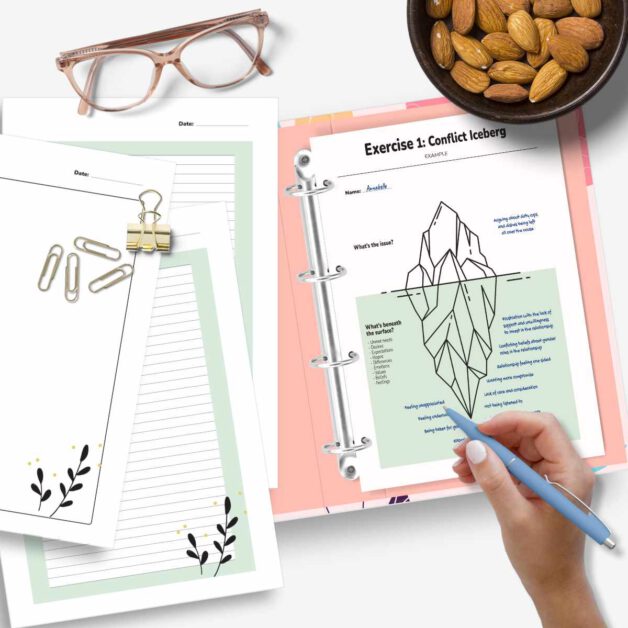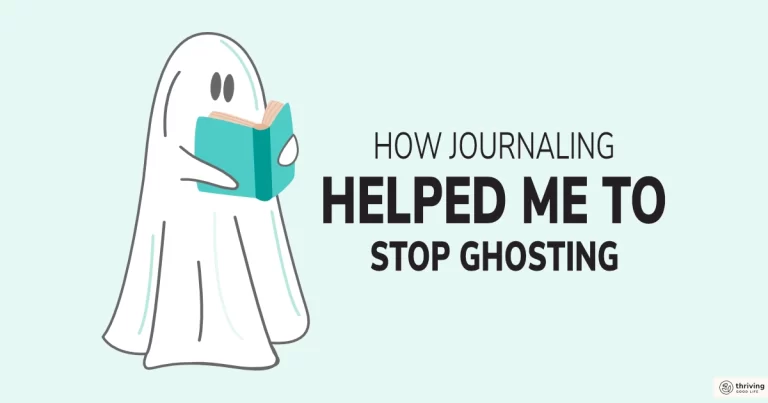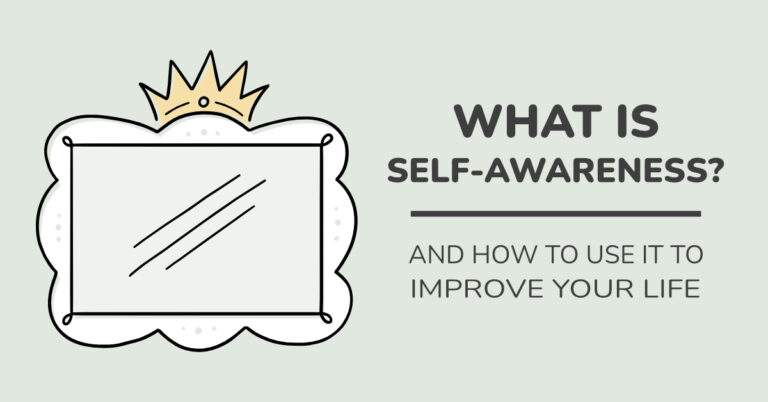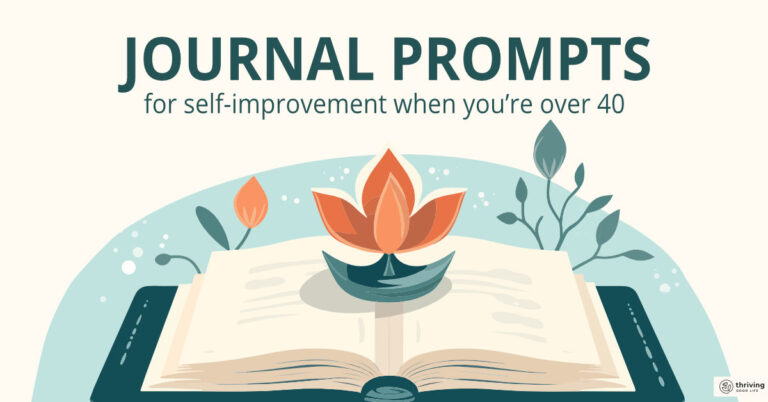How deep is your love, really?
When you’re emotionally connected to someone, there’s this hard-to-define feeling of closeness you share. You feel seen, heard, and understood on a deep level.
And when you’re with someone you feel intensely connected to, you can share your true self without feeling judged. There’s a level of trust that makes you feel safe, so it’s easier to open up and be emotionally intimate.
The thing about this type of connection though, is that it takes work to maintain.
It can slip away, initially without you even realising. But at some point, you’ll definitely notice. You won’t feel as close to your beloved as you once did.
Things they say, or do that you used to find adorable, start to grate on you. You’ll wonder if you even still like them anymore. And that’s hard to admit because it feels like such a betrayal.
Disconnect happens to couples when there’s little to no emotional intimacy 1.
Think of your relationship as an emotional bank account 2 – you can make deposits with understanding, care and appreciation. But you can also deplete the balance with lack of care, disrespect and disregard for feelings.
One way to make regular deposits into your emotional bank, is through journaling as a couple. And in this article, I share 93 couples journal prompts to help you build a stronger bond emotionally.
💡 Related Articles:
- 48 Relationship Journal Prompts to Help Rekindle the Spark
- How to Start a Relationship Journal
- 31 Couples Journal Ideas for Inspiration of What to Write
- 25 Activity Books for Couples (From Guided Prompt Journals to Quizzes)
Before We Begin
Regular couple journaling will help you become more intentional and open about discussing aspects of your relationship. Not quite couples therapy, but it does involve a lot of probing and reflection.
If your beloved is on the same page, is ready and willing to build your dream relationship, you’ll both benefit from this exercise. If they’re not, don’t force it.
You want to strengthen your connection, not cause additional relationship issues.
Maybe your partner isn’t ready to go there just yet. Maybe they’re unsure or worried about getting emotionally naked with you (which is not a you issue, it’s a them issue).
If that’s the case, I encourage you to try journaling about your relationship on your own. Feel it out. Fall in love with it. You’ll start seeing changes in yourself that will radiate into your relationship.
List of Journal Prompts for Couples
I’ve divided these couples journal questions into five main categories:
Shared experiences, understanding and compassion, shared meaning, values and purpose, feeling cared for and valued, and working through disagreements.
These are good questions to journal about with your boyfriend, girlfriend, husband or wife. They also make great starting points to openly talk about any relationship issues, concerns or problems.
Zero in on the areas you want to focus on.
If you want to complete all of these couple prompts in a methodical fashion, do that. If you want to randomly pick and choose, or adapt certain ones to fit your needs better, do that. It’s all good.
Couples journal questions PDF:
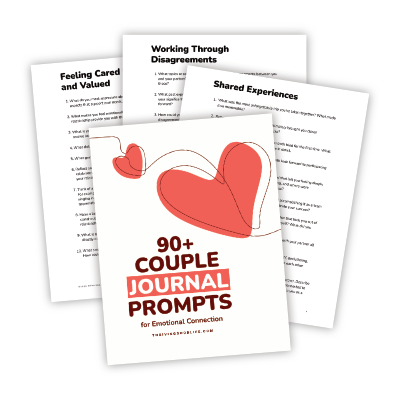
Want a Free PDF Version of These Journal Prompts?
Grab these FREE printable couple journal prompts printable. PLUS access to a library of other journaling pages & worksheets.
By signing up you agree to our T&Cs and Privacy Policy.
Shared Experiences
Shared moments and memories reinforce your bond and bring closeness.
It’s when you’re doing something fun or you feel in sync.
That weekend getaway where you stayed up all night talking about nothing.
Or that beginners salsa dancing class where you couldn’t stop laughing at your (or your sweetheart’s) comical inability to keep to the rhythm.
Here are some writing questions for couples to find, relive and reflect on shared experiences:
1.What was the most unforgettable trip you’ve taken together? What made it so memorable?
2. Reflect on a challenging time that ultimately brought you closer together. How did you grow as a couple?
3. Write about a new hobby or activity you both tried for the first time. What did you choose? Describe the experience in detail.
4. What is a simple pleasure or ritual you both look forward to participating in? Why does it bring you joy?
5. Reflect on a quiet moment with your beloved that left you feeling deeply satisfied and connected. What were you doing, and where were you? What was the best part of that experience?
6. Revisit a shared success or milestone. How did accomplishing it as a team strengthen your bond? What did you do to celebrate your success?
7. When was the last time you did something together that took you out of your comfort zone? What did you learn about yourself? What did you learn about your significant other (SO)?
8. Share a recent experience that made you fall in love with your partner all over again. Describe the experience in detail.
9. What was a recent project you tackled together (e.g., DIY, decluttering, organising)? What skills or strengths did you learn about each other during the process?
10. Write about a favourite recipe you make with or for your partner. Describe the dish in detail. What is the story behind the recipe? Is it connected to certain traditions, holidays, or times of year that are special to you as a couple?
11. Reflect on a major life transition – a career change, move, marriage, kids etc.How did it impact your relationship? What core parts of your relationship stayed the same? What changed? How did it refine your bond?
12. What does your ideal weekend together look like?
13. What beloved ritual or activity do you hope to recreate again soon? Take a moment together to plan it out.
14. Write about a recent decision you made together. Why was this decision necessary? What factors did you consider during the decision-making process? Looking back, would both of you still make the same decision today?
15. What song, movie, book, or other media holds special meaning in your relationship? What is the story behind this?
16. Write about a favourite spot or location you love returning to as a couple. What makes it so special?
17. Envision a happy shared moment between you and your partner in the future. What does this ideal scene look like?
18. What is your fondest memory from the early days of dating your sweetheart?
19. Recall the first shared laugh you had with your partner. What was the moment, and what made it so funny?
20. Together, plan out a thoughtful date night in your journal. Focus on making your SO feel understood, valued and cherished. Describe the experience you wish to create and why your sweetheart will find it meaningful.
Understanding and Compassion
True understanding means really seeing each others inner world. The good stuff. The messy stuff. And all the bits in-between.
Understanding each others wounds, needs, and love languages builds compassion. Along with trust, and emotional intimacy that makes your relationship feel like a safe, solid rock.
It’s being able to say:
“I know your childhood was painful, so when you get upset, it likely brings up those scars.”
“I know crowds make you anxious, so I appreciate you coming to this big family party with me.”
You may or may not already know some of the answers to the following prompts.
If so, treat this as a refresher exercise. If you’ve never dabbled to this depth, be ready to discover something new about yourself and your SO.
Couple questions to journal about for deeper understanding and compassion:
Self-Understanding
1. What were you curious about as a child?
2. Write about a painful childhood experience. How has this shaped the person you are today?
3. Who was your favourite person growing up and why?
4. How often do you feel truly happy? What does that feel like?
5. What tends to make you feel sad?
6. When you’re sad or upset, what do you most need – space, comfort, or something else?
7. Are you living your truest life? If not, what needs to change?
8. What part of yourself do you hide from others?
9. In which situations do you feel you can truly be yourself?
10. Is there something you’ve never shared that you would feel comfortable opening up about? What is it?
11. Is there anything you feel you need to forgive yourself for? How can you get to a place of self-forgiveness?
12. What has been a major turning point in the way you see yourself?
13. What worries or fears are you grappling with now?
14. What are some insecurities you wrestle with?
15. What are your top 2-3 emotional needs in this relationship?
Interactions with Partner
16. How do you know when your SO is in need of your attention? Think about their body language, gestures, tone of voice, facial expressions, or a change in their regular behaviour.
17. How do your insecurities shape your interactions with your partner? Does your mood, stress level, or certain triggers heighten these insecurities? How so?
18. Write about the last time your partner was upset. What happened? How did you respond? How did you feel about the way you responded? Could you have done better? How?
19. When was the last time you felt deeply understood by your SO? Was it through their words, actions, or just a comforting silence? How have you shown understanding and support to them in return?
20. Reflect on a time you were impatient with your significant other. Describe any external internal factors, like stress or time constraints, that influenced your response? How could you have responded with more grace and compassion?
21. What is something you find difficult that you wish your partner understood better?
Values, Meaning and Shared Purpose
Having a rock-solid foundation of shared purpose and values is like superglue for your relationship.
Maybe you treasure the same traditions -passing down recipes that have been in the family for generations. Or making ethically-minded choices because you want to make the world a little better.
Are you still committed to the same path together? Let’s find out.
Couples journal prompts for exploring the depths of your values, shared purpose and meaning:
1. In what ways do you think you’re alike?
2. In what ways do you think you’re different from one another?
3. What do you consider to be the foundation of a happy, healthy, loving relationship?
4. What does quality time together look like for you? How can you and your significant other make it a priority to have more meaningful experiences?
5. What are some of the most important/core values that you and your partner share? What do these values mean to you?
6. How do you see your values influencing your future together? Think about how these might guide major decisions or day-to-day interactions.
7. Are there any differences in your respective value systems? How have you navigated these differences, and what have you learned from them?
8. What values feel most important to you individually? Do you feel your partner fully respects these? If not, what could help deepen their understanding?
9. What traditions have you adopted or created together? Describe their meaning and significance to your relationship.
10. What are some unique customs or rituals you currently enjoy participating in together?
11. What are some new customs or rituals you would like to introduce to your relationship? Why are these of interest to you?
12. How do you both respond when faced with conflicting opinions and values from friends or family? Think about instances where you’ve stood united.
13. How do you maintain your individuality while still prioritising your shared values as a couple? What boundaries or practices help you balance those?
14. What values would you like to pass on to your children (if you decide to have any) or younger generations? How can you and your SO teach and model these values?
15. In what ways do you and your partner support the same causes? Write about the importance of these causes to you and how they represent your shared values.
16. Think about the dreams and goals you and your significant other share for your future. How do your common values and sense of purpose influence these?
17. Are there any goals you no longer want to pursue? If so, why not? How does this decision affect you and your relationship?
18. What lasting impact or influence do you want to leave? Why is this important to you and/or your relationship?
19. If you were to write a shared mission statement for your relationship, what would you write? Reflect on why this mission resonates with both of you?
Feeling Cared For and Valued
Nothing nurtures love like feeling seen, appreciated, and doted on by your partner.
Big displays of love and support during difficult times mean a lot – like when your sweetheart steps up to help you look after a sick relative. But it’s often the simple, daily acts that make you feel all kinds of special.
It’s when your beloved remembers to make your coffee just the way you like it. Or they give you an hour-long foot rub, even though you know they don’t really want to.
Couples prompts for reflecting on how you care and value each other, as well as highlighting areas for improvement:
1. What do you most appreciate about your relationship? Reflect on the aspects that support your needs, wants, and desires.
2. What makes you feel emotionally safe and secure? How does being in this relationship provide you with this safety and security?
3. What is your love language? What are your favourite ways to express and receive love?
4. What daily rituals or gestures make you feel especially valued?
5. What gestures of care and appreciation would you like to receive more of?
6. Reflect on the last time your partner succeeded at something. Did you celebrate them? If so how? If not, why not? What does this reveal about your relationship?
7. Think of a time your partner stepped outside their comfort zone for you. For example, going to a Karaoke night with you, even though they hate singing in public. How did that make you feel? How did you express your appreciation?
8. Make a list of your significant others most admirable traits. Pick one stand-out trait and write about how it positively impacts you and your relationship.
9. What is one thoughtful act of service your partner did recently? How did it directly or indirectly benefit you or lighten your load?
10. What small acts of kindness have started to feel routine or obligatory? How could you revive meaning in those gestures?
11. How often do you typically express heartfelt gratitude and praise for your beloved? What are three things you appreciate about them right now?
12. Do you sometimes neglect or forget to thank your SO for routine efforts? If so, how can you be more vocal in expressing your affection, appreciation, and admiration for them?
13. What’s an area where you sometimes feel underappreciated? How could your partner better express appreciation and validate you in this area?
14. How well do you communicate your needs to your sweetheart? How well do they listen to and validate your needs? Is there anything they could do better in this area? Is so, what?
15. Write about a time when you needed some reassurance from your significant other. How well did they respond to your needs? How did you respond back?
16. What sacrifices has your beloved made for you or your relationship that you are eternally grateful for? What does making these sacrifices say about their love and commitment to you and your relationship?
17. What housework or chores does your partner handle that you may fail to fully acknowledge? How could you express more gratitude for these efforts?
18. What is your significant others comfort level when it comes to public displays of affection? How does this differ from yours? How can you show affection in a way that respects their boundaries and your need for physical closeness?
Working Through Disagreements
Sometimes, disagreements happen.
And whether it’s a minor tiff, or a major clash, it’s how we handle it that matters.
The goal isn’t to “win” arguments. It’s to make sure you both feel heard and respected, even when you don’t agree. Easier said than done, I know.
But with intentional focus, empathy and good communication, conflicts can actually bring you closer together. That said, it requires both parties to take accountability and responsibility for their actions – again, not easy to always do in the heat of the moment.
Couples journaling prompts around fighting fair – sticking to the issues, being respectful, and finding compromise:
1. What topics or recurring issues tend to spark disagreements between you and your partner? How could you have healthier discussions around these?
2. What past experiences or patterns may be fuelling unhealthy fights with your significant other? How could acknowledging these help you move forward?
3. How could you communicate in a calmer, more constructive manner when disagreements arise to avoid increasing tensions?
4. When dealing with conflict, what approaches do you or your SO lean towards – avoidance, defensiveness, anger, passive-aggressiveness, something else? How can understanding these patterns help you manage future conflicts more effectively?
5. What rules can you establish to avoid hurting each other during arguments? For example taking a time out to cool off. How can you keep yourself accountable to this?
6. What strategies can you use to understand your significant others point of view better, rather than preparing counter-arguments?
7. When you and your partner disagree, how can you listen attentively to really understand their point of view? What things could you do to show them you care about what they’re saying?
8. Are there any unresolved issues you’re avoiding right now that need to be addressed? What are these? Why are you avoiding them?
9. Write about your thoughts on compromise. How do you define it? Is it ever an option? If so, under what circumstances?
10. Do you and your partner fight clean – sticking to the topic at hand rather than dragging up old issues or taking cheap shots? If not, reflect on what causes conversations to go off track.
11. How can you and your SO get better at reaching an agreement during disagreements?
12. Do you or your significant other have a tendency to hold grudges after arguments? How can you let these go so you can forgive and move on?
13. Have any unresolved conflicts created distance between you and your SO? What will it take to reconnect?
14. What does a heartfelt apology look like to you?
15. What does forgiving each other after an argument look like?
It’s natural for relationship issues to creep up over time. We fall into comfortable habits and take each other for granted. But staying emotionally connected takes effort.
And you’ve both got to put the work in. That takes commitment.
And if you choose shared journaling as your tool for growth, well that takes a great deal of vulnerability. These carefully crafted couple journal prompts will give you the questions you need to experience closeness on another level.
Give them a try. Sit down, write honestly, ‘listen’ to each others reflections. Stay committed even when it gets uncomfortable. A stronger relationship is worth the effort. You’ve got this.
Did you find these couples journal prompts helpful?
— Pin it for later —
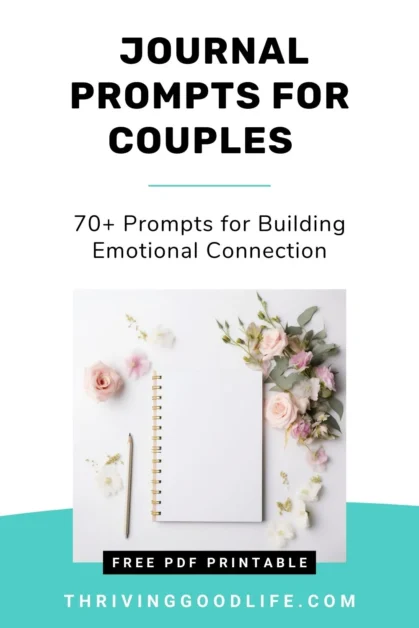

Footnotes
- Bloom, L., & Bloom, C. (2013, March 21). Emotional intimacy. Psychology Today.
- Dr. John Gottman first introduced the metaphor of an emotional bank account in his research on marital stability and divorce prediction in the 1980s, although the concept has been popularised by Stephen Covey in his book The 7 Habits of Highly Effective People.










